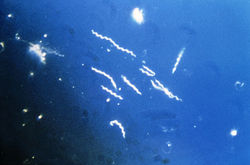Difference between revisions of "Borrelia burgdorferi"
| (7 intermediate revisions by the same user not shown) | |||
| Line 1: | Line 1: | ||
| − | {{ | + | {{OpenPagesTop}} |
| − | |||
{{Taxobox | {{Taxobox | ||
|name =''Borrelia burgdorferi'' | |name =''Borrelia burgdorferi'' | ||
| Line 10: | Line 9: | ||
|species =''B. burgdorferi'' | |species =''B. burgdorferi'' | ||
}} | }} | ||
| − | + | ==Introduction== | |
| − | |||
[[File:Borrelia b.jpg|right|thumb|250px|<small><center> ''Borrelia burgdorferi''. (CDC 1993, Wikimedia commons)</center></small>]] | [[File:Borrelia b.jpg|right|thumb|250px|<small><center> ''Borrelia burgdorferi''. (CDC 1993, Wikimedia commons)</center></small>]] | ||
| − | |||
| − | |||
| − | |||
''Borrelia burgdorferi'' is a species of [[Borrelia species - Overview|''Borrelia'' bacteria]]. ''Borrelia'' species are longer, wider, helical [[Spirochaetes species - Overview|spirochaetes]]. | ''Borrelia burgdorferi'' is a species of [[Borrelia species - Overview|''Borrelia'' bacteria]]. ''Borrelia'' species are longer, wider, helical [[Spirochaetes species - Overview|spirochaetes]]. | ||
| − | The ''Borrelia burgdorferi'' sensu lato complex is the cause of '''[[Lyme | + | The ''Borrelia burgdorferi'' sensu lato complex is the cause of '''[[Lyme Disease]]'''. In the USA it is the ''Borrelia burgdorferi'' sensu stricto that is the most common cause of canine Lyme disease. |
The bacteria are reported to infect humans, dogs, horses, cattle, sheep. | The bacteria are reported to infect humans, dogs, horses, cattle, sheep. | ||
| Line 24: | Line 19: | ||
Bacteria may be cultured in Barbour-Stoenner-Kelly medium after 6 weeks under microaerophilic conditions. The best samples for culture are skin samples from near to the site of tick attachment (as the bacteria remain within the local connective tissues) but the test is not sensitive as the bacteria will be present in low numbers. | Bacteria may be cultured in Barbour-Stoenner-Kelly medium after 6 weeks under microaerophilic conditions. The best samples for culture are skin samples from near to the site of tick attachment (as the bacteria remain within the local connective tissues) but the test is not sensitive as the bacteria will be present in low numbers. | ||
| − | Ticks are the vector for [[Lyme | + | Ticks are the vector for [[Lyme Disease]], in particular, ''[[Ixodes spp.]]''. |
| − | == | + | {{Learning |
| − | + | |literature search = [http://www.cabdirect.org/search.html?rowId=1&options1=AND&q1=%22Borrelia+burgdorferi%22&occuring1=title&rowId=2&options2=AND&q2=&occuring2=freetext&rowId=3&options3=AND&q3=&occuring3=freetext&publishedstart=2000&publishedend=yyyy&calendarInput=yyyy-mm-dd&la=any&it=any&show=all&x=46&y=10 ''Borrelia burgdorferi'' publications since 2000] | |
| + | }} | ||
| − | + | {{review}} | |
| − | + | ||
| − | + | {{OpenPages}} | |
| − | [[Category:Borrelia species]][[Category:Dog]][[Category:Horse Bacteria]][[Category:Cattle]][[Category:Sheep]] | + | [[Category:Borrelia species]][[Category:Dog Bacteria]][[Category:Horse Bacteria]][[Category:Cattle Bacteria]][[Category:Sheep Bacteria]] |
| − | [[Category: | + | [[Category:Expert Review - Bacteria]] |
| − | |||
Latest revision as of 14:08, 20 July 2012
| Borrelia burgdorferi | |
|---|---|
| Phylum | Spirochaetes |
| Class | Spirochaetes |
| Order | Spirochaetales |
| Family | Spirochaetaceae |
| Genus | Borrelia |
| Species | B. burgdorferi |
Introduction
Borrelia burgdorferi is a species of Borrelia bacteria. Borrelia species are longer, wider, helical spirochaetes.
The Borrelia burgdorferi sensu lato complex is the cause of Lyme Disease. In the USA it is the Borrelia burgdorferi sensu stricto that is the most common cause of canine Lyme disease.
The bacteria are reported to infect humans, dogs, horses, cattle, sheep.
Bacteria may be cultured in Barbour-Stoenner-Kelly medium after 6 weeks under microaerophilic conditions. The best samples for culture are skin samples from near to the site of tick attachment (as the bacteria remain within the local connective tissues) but the test is not sensitive as the bacteria will be present in low numbers.
Ticks are the vector for Lyme Disease, in particular, Ixodes spp..
| Borrelia burgdorferi Learning Resources | |
|---|---|
 Search for recent publications via CAB Abstract (CABI log in required) |
Borrelia burgdorferi publications since 2000 |
| This article has been peer reviewed but is awaiting expert review. If you would like to help with this, please see more information about expert reviewing. |
Error in widget FBRecommend: unable to write file /var/www/wikivet.net/extensions/Widgets/compiled_templates/wrt69a32ee86fb877_56158298 Error in widget google+: unable to write file /var/www/wikivet.net/extensions/Widgets/compiled_templates/wrt69a32ee87c0692_12189247 Error in widget TwitterTweet: unable to write file /var/www/wikivet.net/extensions/Widgets/compiled_templates/wrt69a32ee8886aa0_36524913
|
| WikiVet® Introduction - Help WikiVet - Report a Problem |
